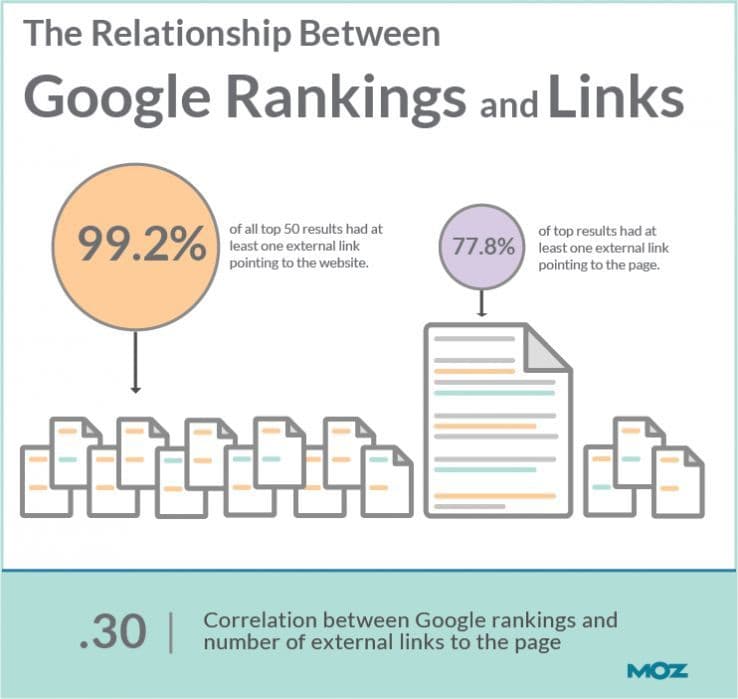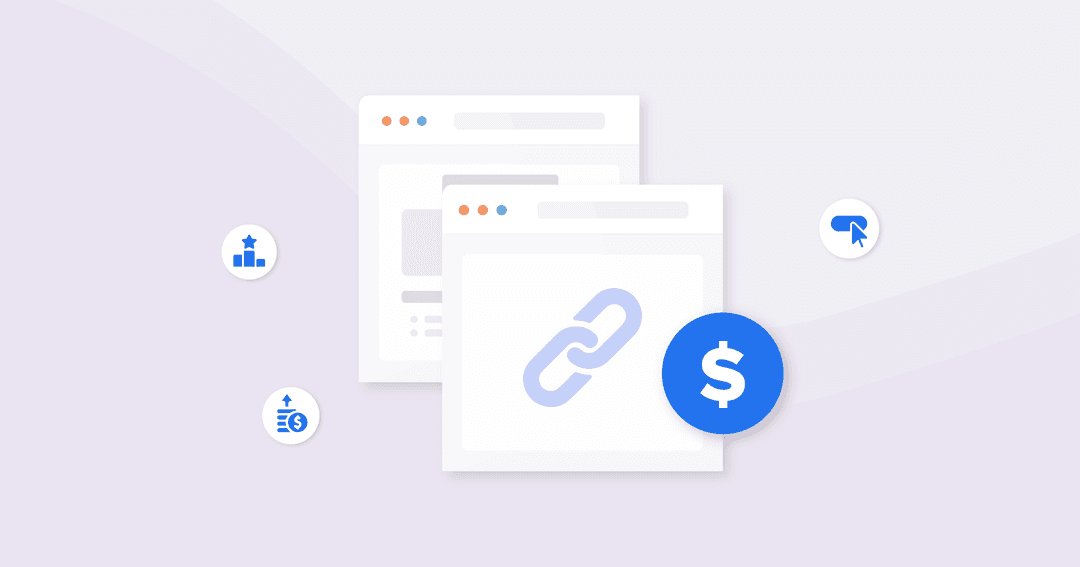Table of Contents
If you have any experience with modern SEO, you know that link building isn't just a matter of posting links on external sources and hoping for the best. Nor is it possible to attain any meaningful search rankings without some kind of link building strategy:

Links pass valuable authority to a domain (and the page in question), but thanks to Google Penguin, innumerable subsequent tweaks and updates, and evolving user preferences, more no longer means better. The quality of backlinks matters far more than the quantity.
In a perfect world, then, you'd be able to invest time and money into a link building strategy with abandon, guaranteeing the best-of-the-best content, publishers, and relationships for your brand.
But in our practical, grounded world, you have a budget and firm goals, and you need to make sure you get the most for every dollar spent. Bad link-building tactics are risky, good link-building tactics are reasonable and efficient, and great link-building tactics are rich in rewards but expensive.
All in all, how much should you be spending for quality link building?
Average Cost for Link Building Services in 2024
Despite some recent words to the contrary from Google, quality link building remains a critical component of a successful SEO strategy in 2024, and the costs associated with these services can vary widely based on the quality, methodology, and scope of the campaign.
Here's a breakdown of what you can expect to pay for link building services this year:
Low-Cost Link Building ($100 - $500 per link)
Characteristics: These services often involve low-quality tactics such as using automated software, link schemes, or outsourcing to low-skilled labor.
Risks: High risk of penalties from search engines, poor link quality, and potential negative SEO impacts.
Suitability: Not recommended for any serious SEO campaign due to the high risks and low value.
Mid-Range Link Building ($500 - $1,500 per link)
Characteristics: This price range typically involves more reputable services that focus on manual outreach and content creation. The links are usually placed on moderately authoritative sites.
Benefits: Improved link quality and better adherence to SEO best practices, offering a reasonable balance of cost and effectiveness.
Suitability: Suitable for small to medium-sized businesses looking to improve their SEO without breaking the bank.
High-End Link Building ($1,500 - $5,000+ per link)
Characteristics: High-end services involve strategic outreach to high-authority sites, bespoke content creation, and long-term relationship building with publishers.
Benefits: High-quality links from authoritative sources, significant SEO benefits, and lower risk of penalties. These links also provide additional benefits like brand visibility and referral traffic.
Suitability: Ideal for large businesses or highly competitive industries where top-tier SEO performance is crucial.
Custom and Enterprise Solutions (Variable)
Characteristics: For enterprises and highly specific campaigns, costs can be even higher, often involving custom strategies tailored to unique business goals and industry requirements.
Benefits: Fully tailored services that offer maximum impact and alignment with business objectives, including comprehensive reporting and continuous strategy adjustments.
Suitability: Best for large enterprises with significant budgets and specific, high-impact goals.
Factors Influencing Cost
Industry and Niche: Highly competitive industries often require more expensive and sophisticated link-building strategies.
Link Quality: Links on higher Domain Authority (DA) are harder to come by, but the effort (and the cost associated with that effort) may be worth it due to their impact on SEO.
Content Requirements: High-quality, original content creation for guest posts or link placements increases costs.
Outreach Complexity: Manual outreach and relationship-building efforts are time-consuming and resource-intensive, contributing to higher costs.
Vendor Reputation: Established vendors with proven track records typically charge more for their expertise and reliability.
Why Buying Backlinks Is a Bad Idea
In the quest for improved search engine rankings, some businesses are tempted to buy backlinks as a quick fix. However, buying backlinks is fraught with risks and ethical concerns that can undermine your long-term SEO efforts.
Here are just a few risks associated with the outdated practice of buying backlinks:
Violating Google’s Guidelines: Google's algorithms are designed to detect and penalize sites that engage in manipulative link-building practices. Buying backlinks is explicitly against Google’s Webmaster Guidelines and can lead to severe penalties, including drastic drops in rankings or complete removal from search results.
Low-Quality Links: Purchased backlinks often come from low-quality, irrelevant sites that do not add value to the SEO strategy. These links can dilute domain authority and harm a website's reputation.
Financial Waste: Spending money on backlinks that do not provide sustainable value is a poor investment. The short-term gains are rarely worth the long-term consequences of potential penalties and lost credibility.
The Risk of Low-Quality Link Building
First, you have to know what the real cost of link building is. Old-school tactics and black-hat techniques are the easiest to identify as spammy. Black-hat typically arise as link spam, link schemes, or other deliberate efforts to manipulate rankings without any other benefit for the users involved. There's no shortage of people willing to employ these tactics for you, but you have to be aware of the risks.
You might be able to pay $5 for a link, but what is that link really doing for your brand? If you're unlucky, and the link is egregious enough to attract attention for a manual Google penalty, you could end up seeing a massive traffic drop like this:

(Image Source: Moz)
Even if you don't, the low authority of existing links in your link profile might actually dilute your website's authority and trust in the eyes of search engines. Put simply, they'll do more harm than good. In fact, in rare instances, hyper-competitive businesses have resorted to negative SEO attacks where they build these low-authority links pointing to their competitors' sites. Bad links, then, will always hold a risk of not just failing to return your investment, but actively sabotage your site's future ranking potential.
The Value of Good Link Building
Good link building, on the other hand, is more valuable than just avoiding the risk of bad link building. By attracting links naturally through original, high-value content and guest posting on high-authority, relevant sources, you'll gain authority, but you'll also open the door to other advantages.
For example, acquiring links from high-profile publishers can earn you high, recurring returns of referral traffic. Your affiliation with a major brand can give you trust badges, and authority by association, which strengthens your brand reputation and may lead to higher conversions. Here’s an example of how you could display logos of the websites from which you’ve received mentions or links. Would you be more likely to buy from a website that had received similar endorsements?

Furthermore, good link building has a permanence to it; because you know your tactics are valuable to users, you never have to worry about your links getting removed. Instead, they'll grow in value over time.
All in all, a single, well-placed link can return hundreds, or even thousands of dollars to your domain's value. This may seem like an exaggeration, but don't forget this includes direct traffic, increased Domain Authority and ranking potential, residual compounding effects, and increased brand visibility and authority. That doesn't mean that every link is worth thousands of dollars, but it's certainly possible for an intelligently strategized, long-term campaign.
Impress clients and save hours with custom, automated reporting.
Join 7,000+ agencies that create reports in under 30 minutes per client using AgencyAnalytics. Get started for free. No credit card required.
Already have an account?
Log inTrue Costs
Okay, so now we know the specifics of why bad link building is actually bad and why good link building is good, including the potential value of each, but before we settle on how much you should pay for link building, let's consider the raw costs of each strategy.
Bad link building is cheap because it takes almost no effort to acquire the links. There are a handful of usual suspects with these type of link builders so watch for these, and avoid any agencies or individuals that rely on these tactics:
Overseas Labor. There are some international companies who are excellent at SEO and marketing. However, many shady link builders rely on the low wages and low skillsets of workers in developing countries. As a result, your links will be marred by language barriers and a general absence of actual expertise.
Automated Software. Automated software is responsible for justifying insane offers like $99 for a thousand links since it requires virtually no overhead or human resource costs. These processes are spam, in the truest sense, and will almost certainly earn your website a penalty.
Link Networks and Schemes. Schemes rely on mutual exchanges of links or multi-layered link juicing maneuvers to try and fool Google. They're quick to execute, but Google is sharp and typically catches on quickly.
Fiverr and Manual Placement. Some independent link builders, especially those on sites like Fiverr, will offer to place individual links for arbitrarily small sums of cash. These users often mean well, but don't understand the true mechanics of modern link building. In fact, Fiverr is a popular destination for finding contractors to execute negative SEO because the quality of the links are so poor.
These techniques are cheap because they require no expertise, value, or time, and because there's little to no demand for them; even novice SEOs quickly figure out the lack of value in these tactics.
Good strategies, on the other hand, rely on building relationships. They rely on developing high-quality content that people actually want to read. They rely on experience and authority in knowing when and how to build different links, and how to diversify your strategy and scale up over time. You can't write a great article in 20 minutes. You can't build a relationship with a major publisher in a day. You can't become a link building expert in a month.
Good link building is expensive because it takes time, resources, relationships, and most of all, adds actual value.
Other Considerations
I also want to touch on some other benefits you might receive from a professional link building vendor. Aside from the costs of building relationships and producing high-quality content, you'll also be paying for the following peripheral benefits and services (with individual contractors or broader agencies):
Transparency is a good quality in a link builder; you want to know the whats, whens, whys, and how it will help you both understand your campaign better and see better long-term results.
Even with good links, it's not enough to just place them and hope for the best. You need reporting metrics like traffic patterns and growth to justify your investment.
No link building strategy goes perfectly all the time. Eventually, you'll run into a problem. When you do, you want a link building vendor who's willing to go the extra mile to correct the problem and proactively prevent it from happening again.
Finally, link building doesn't exist in a vacuum. This isn't the final stage of link building. Google will continue to evolve, as will link building best practices, so you need a partner who's willing to evolve with the times. Think of future value, not just present value.
It's up to you whether you want to pay more for a provider who offers these kinds of services, but in my experience, they're well worth the cost.
You Get What You Pay For
As a general rule, when it comes to link building, you get what you pay for. The more you pay, assuming you're working with a reasonable provider, the more value you'll eventually get (including objective benefits like traffic and peripheral benefits like reliability and reporting). However, this doesn't function on a strictly sliding scale; paying low amounts for link building may actually cost you more money than you put in, and there's a certain threshold for link quality that doesn't take hold until you start investing in good link building strategies.
Though costs vary wildly based on your industry, your location, and your goals, link building is a necessary part of any SEO campaign. The more you put into it, the more SEO benefits you'll get out of it. It's an effort-intensive strategy, but the results are well worth it.

Written by
Jayson Demers is the founder & CEO of EmailAnalytics and OutreachBloom. He helps teams boost productivity with email activity insights and drives B2B growth through done-for-you cold email outreach.
Read more posts by Jayson DemersSee how 7,000+ marketing agencies help clients win
Free 14-day trial. No credit card required.






